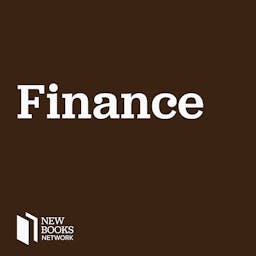Shows

The Podcast BrowserJerome Powell: “We don't think you're a straight shooter" Podcast: New Books in Economic and Business History (LS 32 · TOP 5% what is this?)Episode: Jerome Powell: “We don't think you're a straight shooter"Pub date: 2025-05-04
2025-05-3049 min
The Podcast BrowserJanet Yellen: “She had a view that the world was on fire” Podcast: New Books in Economic and Business History (LS 32 · TOP 5% what is this?)Episode: Janet Yellen: “She had a view that the world was on fire”Pub date: 2025-05-03Get Podcast Transcript →powered by Listen411 - fast audio-to-text and summarizationMore than any other single institution, the US Federal Reserve drives global capital markets with its decisions and communications. While its interest rates are set by a committee, for almost a century, the Fed’s philosophy and operational approach have been moulded by one person: the Chair of the Board of...
2025-05-2157 min
The Podcast BrowserBen Bernanke: “Like being a paleontologist” Podcast: New Books in Economic and Business History (LS 32 · TOP 5% what is this?)Episode: Ben Bernanke: “Like being a paleontologist”Pub date: 2025-05-02Get Podcast Transcript →powered by Listen411 - fast audio-to-text and summarizationMore than any other single institution, the US Federal Reserve drives global capital markets with its decisions and communications. While its interest rates are set by a committee, for almost a century, the Fed’s philosophy and operational approach have been moulded by one person: the Chair of the Board of Governors.
In the first...
2025-05-1343 min
The Podcast BrowserAlan Greenspan: “The man who knew” Podcast: New Books in Economic and Business History (LS 32 · TOP 5% what is this?)Episode: Alan Greenspan: “The man who knew”Pub date: 2025-05-01Get Podcast Transcript →powered by Listen411 - fast audio-to-text and summarizationMore than any other single institution, the US Federal Reserve drives global capital markets with its decisions and communications. While its interest rates are set by a committee, for almost a century, the Fed’s philosophy and operational approach have been moulded by one person: the Chair of the Board of Governors.
In the first...
2025-05-0548 min
New Books in American PoliticsJerome Powell: “We don't think you're a straight shooter"More than any one institution, the US Federal Reserve drives global capital markets with its decisions and communications. While its interest rates are set by a committee, for almost a century, the Fed’s philosophy and operational approach have been moulded by one person: the Chair of the Board of Governors.
In the first series of The Chair, Tim Gwynn Jones talked to authors of books about the Fed's foundational Chairs – Marriner Eccles, Bill Martin, Arthur Burns, and Paul Volcker. In this second series, he covers the people who chaired the Fed through the post-1990 period of fina...
2025-05-0451 min
New Books in Political ScienceJerome Powell: “We don't think you're a straight shooter"More than any one institution, the US Federal Reserve drives global capital markets with its decisions and communications. While its interest rates are set by a committee, for almost a century, the Fed’s philosophy and operational approach have been moulded by one person: the Chair of the Board of Governors.
In the first series of The Chair, Tim Gwynn Jones talked to authors of books about the Fed's foundational Chairs – Marriner Eccles, Bill Martin, Arthur Burns, and Paul Volcker. In this second series, he covers the people who chaired the Fed through the post-1990 period of fina...
2025-05-0451 min
New Books in Biography & MemoirJerome Powell: “We don't think you're a straight shooter"More than any one institution, the US Federal Reserve drives global capital markets with its decisions and communications. While its interest rates are set by a committee, for almost a century, the Fed’s philosophy and operational approach have been moulded by one person: the Chair of the Board of Governors.
In the first series of The Chair, Tim Gwynn Jones talked to authors of books about the Fed's foundational Chairs – Marriner Eccles, Bill Martin, Arthur Burns, and Paul Volcker. In this second series, he covers the people who chaired the Fed through the post-1990 period of fina...
2025-05-0451 min
New Books in Economic and Business HistoryJerome Powell: “We don't think you're a straight shooter"More than any one institution, the US Federal Reserve drives global capital markets with its decisions and communications. While its interest rates are set by a committee, for almost a century, the Fed’s philosophy and operational approach have been moulded by one person: the Chair of the Board of Governors.
In the first series of The Chair, Tim Gwynn Jones talked to authors of books about the Fed's foundational Chairs – Marriner Eccles, Bill Martin, Arthur Burns, and Paul Volcker. In this second series, he covers the people who chaired the Fed through the post-1990 period of fina...
2025-05-0451 min
New Books in FinanceJerome Powell: “We don't think you're a straight shooter"More than any one institution, the US Federal Reserve drives global capital markets with its decisions and communications. While its interest rates are set by a committee, for almost a century, the Fed’s philosophy and operational approach have been moulded by one person: the Chair of the Board of Governors.
In the first series of The Chair, Tim Gwynn Jones talked to authors of books about the Fed's foundational Chairs – Marriner Eccles, Bill Martin, Arthur Burns, and Paul Volcker. In this second series, he covers the people who chaired the Fed through the post-1990 period of fina...
2025-05-0449 min
New Books in EconomicsJerome Powell: “We don't think you're a straight shooter"More than any one institution, the US Federal Reserve drives global capital markets with its decisions and communications. While its interest rates are set by a committee, for almost a century, the Fed’s philosophy and operational approach have been moulded by one person: the Chair of the Board of Governors.
In the first series of The Chair, Tim Gwynn Jones talked to authors of books about the Fed's foundational Chairs – Marriner Eccles, Bill Martin, Arthur Burns, and Paul Volcker. In this second series, he covers the people who chaired the Fed through the post-1990 period of fina...
2025-05-0451 min
New Books in EconomicsJanet Yellen: “She had a view that the world was on fire”More than any other single institution, the US Federal Reserve drives global capital markets with its decisions and communications. While its interest rates are set by a committee, for almost a century, the Fed’s philosophy and operational approach have been moulded by one person: the Chair of the Board of Governors.
In the first series of The Chair, Tim Gwynn Jones talked to authors of books about the Fed's foundational Chairs – Marriner Eccles, Bill Martin, Arthur Burns, and Paul Volcker. In this second series, he covers the people who chaired the Fed through the post-1990 period of f...
2025-05-0359 min
New Books in Biography & MemoirJanet Yellen: “She had a view that the world was on fire”More than any other single institution, the US Federal Reserve drives global capital markets with its decisions and communications. While its interest rates are set by a committee, for almost a century, the Fed’s philosophy and operational approach have been moulded by one person: the Chair of the Board of Governors.
In the first series of The Chair, Tim Gwynn Jones talked to authors of books about the Fed's foundational Chairs – Marriner Eccles, Bill Martin, Arthur Burns, and Paul Volcker. In this second series, he covers the people who chaired the Fed through the post-1990 period of f...
2025-05-0359 min
New Books in Political ScienceJanet Yellen: “She had a view that the world was on fire”More than any other single institution, the US Federal Reserve drives global capital markets with its decisions and communications. While its interest rates are set by a committee, for almost a century, the Fed’s philosophy and operational approach have been moulded by one person: the Chair of the Board of Governors.
In the first series of The Chair, Tim Gwynn Jones talked to authors of books about the Fed's foundational Chairs – Marriner Eccles, Bill Martin, Arthur Burns, and Paul Volcker. In this second series, he covers the people who chaired the Fed through the post-1990 period of f...
2025-05-0359 min
New Books in American PoliticsJanet Yellen: “She had a view that the world was on fire”More than any other single institution, the US Federal Reserve drives global capital markets with its decisions and communications. While its interest rates are set by a committee, for almost a century, the Fed’s philosophy and operational approach have been moulded by one person: the Chair of the Board of Governors.
In the first series of The Chair, Tim Gwynn Jones talked to authors of books about the Fed's foundational Chairs – Marriner Eccles, Bill Martin, Arthur Burns, and Paul Volcker. In this second series, he covers the people who chaired the Fed through the post-1990 period of f...
2025-05-0359 min
New Books in FinanceJanet Yellen: “She had a view that the world was on fire”More than any other single institution, the US Federal Reserve drives global capital markets with its decisions and communications. While its interest rates are set by a committee, for almost a century, the Fed’s philosophy and operational approach have been moulded by one person: the Chair of the Board of Governors.
In the first series of The Chair, Tim Gwynn Jones talked to authors of books about the Fed's foundational Chairs – Marriner Eccles, Bill Martin, Arthur Burns, and Paul Volcker. In this second series, he covers the people who chaired the Fed through the post-1990 period of f...
2025-05-0357 min
New Books in Economic and Business HistoryJanet Yellen: “She had a view that the world was on fire”More than any other single institution, the US Federal Reserve drives global capital markets with its decisions and communications. While its interest rates are set by a committee, for almost a century, the Fed’s philosophy and operational approach have been moulded by one person: the Chair of the Board of Governors.
In the first series of The Chair, Tim Gwynn Jones talked to authors of books about the Fed's foundational Chairs – Marriner Eccles, Bill Martin, Arthur Burns, and Paul Volcker. In this second series, he covers the people who chaired the Fed through the post-1990 period of f...
2025-05-0359 min
New Books in Political ScienceBen Bernanke: “Like being a paleontologist”More than any other single institution, the US Federal Reserve drives global capital markets with its decisions and communications. While its interest rates are set by a committee, for almost a century, the Fed’s philosophy and operational approach have been moulded by one person: the Chair of the Board of Governors.
In the first series of The Chair, Tim Gwynn Jones talked to authors of books about the Fed's foundational Chairs – Marriner Eccles, Bill Martin, Arthur Burns, and Paul Volcker. In this second series, he covers the people who chaired the Fed through the post-1990 period of f...
2025-05-0244 min
New Books in Economic and Business HistoryBen Bernanke: “Like being a paleontologist”More than any other single institution, the US Federal Reserve drives global capital markets with its decisions and communications. While its interest rates are set by a committee, for almost a century, the Fed’s philosophy and operational approach have been moulded by one person: the Chair of the Board of Governors.
In the first series of The Chair, Tim Gwynn Jones talked to authors of books about the Fed's foundational Chairs – Marriner Eccles, Bill Martin, Arthur Burns, and Paul Volcker. In this second series, he covers the people who chaired the Fed through the post-1990 period of f...
2025-05-0244 min
New Books in FinanceBen Bernanke: “Like being a paleontologist”More than any other single institution, the US Federal Reserve drives global capital markets with its decisions and communications. While its interest rates are set by a committee, for almost a century, the Fed’s philosophy and operational approach have been moulded by one person: the Chair of the Board of Governors.
In the first series of The Chair, Tim Gwynn Jones talked to authors of books about the Fed's foundational Chairs – Marriner Eccles, Bill Martin, Arthur Burns, and Paul Volcker. In this second series, he covers the people who chaired the Fed through the post-1990 period of f...
2025-05-0243 min
New Books in EconomicsBen Bernanke: “Like being a paleontologist”More than any other single institution, the US Federal Reserve drives global capital markets with its decisions and communications. While its interest rates are set by a committee, for almost a century, the Fed’s philosophy and operational approach have been moulded by one person: the Chair of the Board of Governors.
In the first series of The Chair, Tim Gwynn Jones talked to authors of books about the Fed's foundational Chairs – Marriner Eccles, Bill Martin, Arthur Burns, and Paul Volcker. In this second series, he covers the people who chaired the Fed through the post-1990 period of f...
2025-05-0244 min
New Books in American PoliticsBen Bernanke: “Like being a paleontologist”More than any other single institution, the US Federal Reserve drives global capital markets with its decisions and communications. While its interest rates are set by a committee, for almost a century, the Fed’s philosophy and operational approach have been moulded by one person: the Chair of the Board of Governors.
In the first series of The Chair, Tim Gwynn Jones talked to authors of books about the Fed's foundational Chairs – Marriner Eccles, Bill Martin, Arthur Burns, and Paul Volcker. In this second series, he covers the people who chaired the Fed through the post-1990 period of f...
2025-05-0244 min
New Books in Biography & MemoirBen Bernanke: “Like being a paleontologist”More than any other single institution, the US Federal Reserve drives global capital markets with its decisions and communications. While its interest rates are set by a committee, for almost a century, the Fed’s philosophy and operational approach have been moulded by one person: the Chair of the Board of Governors.
In the first series of The Chair, Tim Gwynn Jones talked to authors of books about the Fed's foundational Chairs – Marriner Eccles, Bill Martin, Arthur Burns, and Paul Volcker. In this second series, he covers the people who chaired the Fed through the post-1990 period of f...
2025-05-0244 min
New Books in FinanceAlan Greenspan: “The man who knew”More than any other single institution, the US Federal Reserve drives global capital markets with its decisions and communications. While its interest rates are set by a committee, for almost a century, the Fed’s philosophy and operational approach have been moulded by one person: the Chair of the Board of Governors.
In the first series of The Chair, Tim Gwynn Jones talked to authors of books about the Fed's foundational Chairs – Marriner Eccles, Bill Martin, Arthur Burns, and Paul Volcker. In this second series, he covers the people who chaired the Fed through the post-1990 period of f...
2025-05-0148 min
New Books in Political ScienceAlan Greenspan: “The man who knew”More than any other single institution, the US Federal Reserve drives global capital markets with its decisions and communications. While its interest rates are set by a committee, for almost a century, the Fed’s philosophy and operational approach have been moulded by one person: the Chair of the Board of Governors.
In the first series of The Chair, Tim Gwynn Jones talked to authors of books about the Fed's foundational Chairs – Marriner Eccles, Bill Martin, Arthur Burns, and Paul Volcker. In this second series, he covers the people who chaired the Fed through the post-1990 period of f...
2025-05-0147 min
New Books in Biography & MemoirAlan Greenspan: “The man who knew”More than any other single institution, the US Federal Reserve drives global capital markets with its decisions and communications. While its interest rates are set by a committee, for almost a century, the Fed’s philosophy and operational approach have been moulded by one person: the Chair of the Board of Governors.
In the first series of The Chair, Tim Gwynn Jones talked to authors of books about the Fed's foundational Chairs – Marriner Eccles, Bill Martin, Arthur Burns, and Paul Volcker. In this second series, he covers the people who chaired the Fed through the post-1990 period of f...
2025-05-0147 min
New Books in American PoliticsAlan Greenspan: “The man who knew”More than any other single institution, the US Federal Reserve drives global capital markets with its decisions and communications. While its interest rates are set by a committee, for almost a century, the Fed’s philosophy and operational approach have been moulded by one person: the Chair of the Board of Governors.
In the first series of The Chair, Tim Gwynn Jones talked to authors of books about the Fed's foundational Chairs – Marriner Eccles, Bill Martin, Arthur Burns, and Paul Volcker. In this second series, he covers the people who chaired the Fed through the post-1990 period of f...
2025-05-0149 min
New Books in EconomicsAlan Greenspan: “The man who knew”More than any other single institution, the US Federal Reserve drives global capital markets with its decisions and communications. While its interest rates are set by a committee, for almost a century, the Fed’s philosophy and operational approach have been moulded by one person: the Chair of the Board of Governors.
In the first series of The Chair, Tim Gwynn Jones talked to authors of books about the Fed's foundational Chairs – Marriner Eccles, Bill Martin, Arthur Burns, and Paul Volcker. In this second series, he covers the people who chaired the Fed through the post-1990 period of f...
2025-05-0149 min
New Books in Economic and Business HistoryAlan Greenspan: “The man who knew”More than any other single institution, the US Federal Reserve drives global capital markets with its decisions and communications. While its interest rates are set by a committee, for almost a century, the Fed’s philosophy and operational approach have been moulded by one person: the Chair of the Board of Governors.
In the first series of The Chair, Tim Gwynn Jones talked to authors of books about the Fed's foundational Chairs – Marriner Eccles, Bill Martin, Arthur Burns, and Paul Volcker. In this second series, he covers the people who chaired the Fed through the post-1990 period of f...
2025-05-0149 min
In The Room"Market pressure was growing by the day" with Charles DallaraCharles Dallara, managing director of the Institute of International Finance from 1993–2013, talks about his crisis memoir: Euroshock: How the Largest Debt Restructuring in History Helped Save Greece and Preserve the Eurozone (Rodin Books, 2024). Dallara, who co-led a small team who negotiated a €100-billion write-off of Greek debt in 2011-12, discusses how it felt to be an American "interloper", crippling European indecision, and performative politicians.Produced by Emin Fikić at davidstudio.This is a public episode. If you would like to discuss this with other subscribers or get access to bonus episodes, visit twentyfourtwo.substack.com
2024-03-1939 min
New Books in Eastern European StudiesMark Edele, "Russia's War Against Ukraine: The Whole Story" (Melbourne University, 2023)"That Russia and Ukraine have diverged politically so radically since 1991 is partially due to their position vis-à-vis the imploded empire they emerged from," writes Mark Edele in Russia's War Against Ukraine: The Whole Story (Melbourne University Publishing, 2023).As its subtitle suggests, this short work - "a book by an outsider written for outsiders" - has big ambitions to explain the immediate, long-, and very long-term reasons for the war. How did two so similar yet so different nations emerge? How can “outsiders” separate national myths from true origin stories? Who started the war and how will it end...
2023-08-1345 min
NBN Book of the DayMark Edele, "Russia's War Against Ukraine: The Whole Story" (Melbourne University, 2023)"That Russia and Ukraine have diverged politically so radically since 1991 is partially due to their position vis-à-vis the imploded empire they emerged from," writes Mark Edele in Russia's War Against Ukraine: The Whole Story (Melbourne University Publishing, 2023).As its subtitle suggests, this short work - "a book by an outsider written for outsiders" - has big ambitions to explain the immediate, long-, and very long-term reasons for the war. How did two so similar yet so different nations emerge? How can “outsiders” separate national myths from true origin stories? Who started the war and how will it end...
2023-08-1345 min
New Books in Russian and Eurasian StudiesMark Edele, "Russia's War Against Ukraine: The Whole Story" (Melbourne University, 2023)"That Russia and Ukraine have diverged politically so radically since 1991 is partially due to their position vis-à-vis the imploded empire they emerged from," writes Mark Edele in Russia's War Against Ukraine: The Whole Story (Melbourne University Publishing, 2023).As its subtitle suggests, this short work - "a book by an outsider written for outsiders" - has big ambitions to explain the immediate, long-, and very long-term reasons for the war. How did two so similar yet so different nations emerge? How can “outsiders” separate national myths from true origin stories? Who started the war and how will it end...
2023-08-1345 min
New Books in Ukrainian StudiesMark Edele, "Russia's War Against Ukraine: The Whole Story" (Melbourne University, 2023)"That Russia and Ukraine have diverged politically so radically since 1991 is partially due to their position vis-à-vis the imploded empire they emerged from," writes Mark Edele in Russia's War Against Ukraine: The Whole Story (Melbourne University Publishing, 2023).As its subtitle suggests, this short work - "a book by an outsider written for outsiders" - has big ambitions to explain the immediate, long-, and very long-term reasons for the war. How did two so similar yet so different nations emerge? How can “outsiders” separate national myths from true origin stories? Who started the war and how will it end...
2023-08-1342 min
New Books in Diplomatic HistoryMark Edele, "Russia's War Against Ukraine: The Whole Story" (Melbourne University, 2023)"That Russia and Ukraine have diverged politically so radically since 1991 is partially due to their position vis-à-vis the imploded empire they emerged from," writes Mark Edele in Russia's War Against Ukraine: The Whole Story (Melbourne University Publishing, 2023).As its subtitle suggests, this short work - "a book by an outsider written for outsiders" - has big ambitions to explain the immediate, long-, and very long-term reasons for the war. How did two so similar yet so different nations emerge? How can “outsiders” separate national myths from true origin stories? Who started the war and how will it end...
2023-08-1343 min
New Books in Military HistoryMark Edele, "Russia's War Against Ukraine: The Whole Story" (Melbourne University, 2023)"That Russia and Ukraine have diverged politically so radically since 1991 is partially due to their position vis-à-vis the imploded empire they emerged from," writes Mark Edele in Russia's War Against Ukraine: The Whole Story (Melbourne University Publishing, 2023).As its subtitle suggests, this short work - "a book by an outsider written for outsiders" - has big ambitions to explain the immediate, long-, and very long-term reasons for the war. How did two so similar yet so different nations emerge? How can “outsiders” separate national myths from true origin stories? Who started the war and how will it end...
2023-08-1345 min
New Books in European PoliticsMark Edele, "Russia's War Against Ukraine: The Whole Story" (Melbourne University, 2023)"That Russia and Ukraine have diverged politically so radically since 1991 is partially due to their position vis-à-vis the imploded empire they emerged from," writes Mark Edele in Russia's War Against Ukraine: The Whole Story (Melbourne University Publishing, 2023).As its subtitle suggests, this short work - "a book by an outsider written for outsiders" - has big ambitions to explain the immediate, long-, and very long-term reasons for the war. How did two so similar yet so different nations emerge? How can “outsiders” separate national myths from true origin stories? Who started the war and how will it end...
2023-08-1345 min
In The Room"We couldn't accept that Spain could do better than Italy" with Vincenzo ViscoFour months after taking office in May 1996, Italian prime minister Romano Prodi flew to Valencia for a bilateral summit with his Spanish counterpart José María Aznar. Germany, France and the EU's core members were getting ready to create the euro but Italy needed more time to get its economy in order. In Valencia, Prodi lobbied Aznar to join him in a second wave but met a firm veto. "The Aznar position was very tough and somehow shocking for both Prodi and (Treasury minister) Ciampi," says Vincenzo Visco, Prodi's finance minister. "During the flight back to Italy ... Ciampi convinced Pr...
2023-06-1847 min
In The Room"He was definitely not amused" with Lex HoogduinOn 1 June, the European Central Bank will celebrate its 25th birthday. After its tumultuous teenage years, it's easy to forget its first uncertain steps. In this new episode of In The Room, Lex Hoogduin looks back to his time as right-hand man to the ECB's first president - managing the behind-the-scenes politics and developing the strategy - and at how, in his view, the central bank has since strayed from its mandate.In The Room is a series of conversations with officials who played crucial roles in the history of the EU.Edited and produced...
2023-05-0552 min
In The Room"Now maybe we're a bit spoiled" with Klaus ReglingAs the man who built and ran Europe's financial "firewalls" (the EFSF and ESM) from 2010-2022, Klaus Regling was a central figure in the euro crisis. In this new episode of In The Room, he looks back not just on those 12 tumultuous years but on his time as the European Commission's top economic official and as an architect of Europe's monetary union.In The Room is a series of conversations with officials who played crucial roles in the recent history of the EU.Edited and produced by davidstudio.This is a public episode...
2023-03-0446 min
In The Room"We backed down and we started again" with Andrew McDowellIn 2011, a new Irish coalition took office under Enda Kenny only four months after its predecessor was forced to seek a sovereign bailout. It was left to the Kenny government to pick up the pieces after the collapse of the debt-fuelled “Celtic Tiger” and negotiate a better deal. From 2011-2016,Andrew McDowell was at Kenny’s side as his head of programme implementation and chief economic adviser – bargaining with (among others) German Chancellor Angela Merkel and two European Central Bank presidents.In The Room is a series of conversations with officials who played crucial roles in the r...
2023-02-1751 min
In The Room"Trust was thin on the ground" with Georges HeinrichAs the right-hand man to Jean-Claude Juncker (chairman of the Eurogroup from 2005-13) and vice president of the Euro Working Group from 2011-14, Georges Heinrich found himself in the eye of the euro's financial storm in his late-30s. "Eventually, the right decisions were taken. Solidarity did prevail. Everybody chipped in,” he says. “But we had very, very long discussions on how to split the bill or whether to do a runner and leave one or two guys at the table who aren't so fit and who will then have to answer to the police or wash up the dish...
2023-01-061h 05
In The Room"Look into my eyes: you're gonna go bankrupt" with Thomas WieserEurozone finance ministers coordinate policy through the Eurogroup and its engine room is the Euro Working Group - a committee of top treasury officials from member states and the European Commission. Elected as the EWG's first full-time president in 2009, Thomas Wieser became the one true constant through the tsunami of solvency crises that hit Greece, Ireland, Portugal, Spain, and Cyprus and threatened Italy, and the construction of the EU's financial firewalls. For the Obama Treasury, he was the answer to Henry Kissinger's famous question: "Who do I call if I want to call Europe?" Listen to his account of...
2022-12-091h 05
In The Room"Reality took its revenge" with Ramon FernandezRamon Fernandez, the director-general of the French Treasury 2009-14, reminisces on the euro crisis years – the early signals that “something was wrong” in Greece, the calamitous Deauville summit, managing two power centres in Berlin, working with Emmanuel Macron, and bargaining with the European Central Bank.Edited and produced by davidstudio.This is a public episode. If you would like to discuss this with other subscribers or get access to bonus episodes, visit twentyfourtwo.substack.com Learn more about your ad choices. Visit megaphone.fm/adchoices
2022-11-1143 min
In The Room"Putin united Europe" with Erkki LiikanenA key member of the European Central Bank's governing council (2004–2018), European Commissioner (1995–2004), negotiator for Finland's accession to the EU (1990–1994), and Finnish finance minister (1987–1990) looks back on an extraordinary three decades and forward to Europe after Ukraine.Edited and produced by davidstudio.This is a public episode. If you would like to discuss this with other subscribers or get access to bonus episodes, visit twentyfourtwo.substack.com Learn more about your ad choices. Visit megaphone.fm/adchoices
2022-09-2445 min
New Books in Eastern European StudiesHélène Bienvenu, et al., "La Hongrie sous Orban" (Plein Jour, 2022)"Who knows the name of the Czech prime minister, the name of the head of the Romanian or even the Polish executive branches? Yet, today everyone knows the name of the Hungarian leader: Viktor Orbán. To have a leader known outside the country's borders is a first for Hungarians. Some are frustrated by this: Hungary, they say, isn't just Viktor Orbán".In La Hongrie sous Orban: Histoires de la Grande Plaine (Plein Jour, 2022), Corentin Léotard - together with Hélène Bienvenu, Thomas Laffitte, Joël Le Pavous, Jehan Paumero and Daniel Psenny - tell a s...
2022-04-2254 min
New Books in European PoliticsHélène Bienvenu, et al., "La Hongrie sous Orban" (Plein Jour, 2022)"Who knows the name of the Czech prime minister, the name of the head of the Romanian or even the Polish executive branches? Yet, today everyone knows the name of the Hungarian leader: Viktor Orbán. To have a leader known outside the country's borders is a first for Hungarians. Some are frustrated by this: Hungary, they say, isn't just Viktor Orbán".In La Hongrie sous Orban: Histoires de la Grande Plaine (Plein Jour, 2022), Corentin Léotard - together with Hélène Bienvenu, Thomas Laffitte, Joël Le Pavous, Jehan Paumero and Daniel Psenny - tell a s...
2022-04-2252 min
New Books in Eastern European StudiesRichard Bellamy et al., "Flexible Europe: Differentiated Integration, Democracy, and Domination" (Bristol UP, 2022)The past decade has been pivotal in the development of the European Union.The single currency has been tested to the limits by successive crises in the financial system, public-debt sustainability and public health. A migration crisis stress-tested the EU's free-travel area and its under-developed refugee and asylum policies. The Hungarian and Polish governments are backsliding on the union's foundational commitments to democracy and rule of law and, for the first time in the Communities' six-decade history, a full member state has left altogether.The weaknesses of the EU’s part-federal, part-intergovernmental design have been ex...
2022-01-2451 min
New Books in European PoliticsRichard Bellamy et al., "Flexible Europe: Differentiated Integration, Democracy, and Domination" (Bristol UP, 2022)The past decade has been pivotal in the development of the European Union.The single currency has been tested to the limits by successive crises in the financial system, public-debt sustainability and public health. A migration crisis stress-tested the EU's free-travel area and its under-developed refugee and asylum policies. The Hungarian and Polish governments are backsliding on the union's foundational commitments to democracy and rule of law and, for the first time in the Communities' six-decade history, a full member state has left altogether.The weaknesses of the EU’s part-federal, part-intergovernmental design have been ex...
2022-01-2447 min
New Books in Diplomatic HistoryRichard Bellamy et al., "Flexible Europe: Differentiated Integration, Democracy, and Domination" (Bristol UP, 2022)The past decade has been pivotal in the development of the European Union.The single currency has been tested to the limits by successive crises in the financial system, public-debt sustainability and public health. A migration crisis stress-tested the EU's free-travel area and its under-developed refugee and asylum policies. The Hungarian and Polish governments are backsliding on the union's foundational commitments to democracy and rule of law and, for the first time in the Communities' six-decade history, a full member state has left altogether.The weaknesses of the EU’s part-federal, part-intergovernmental design have been ex...
2022-01-2450 min
New Books in Eastern European StudiesTímea Drinóczi and Agnieszka Bień-Kacała, "Illiberal Constitutionalism in Poland and Hungary" (Routledge, 2021)Over the past decade, Poland and Hungary have become laboratories for a new kind of government: proto-authoritarian regimes that still have regular elections, vibrant oppositions and are externally constrained by EU law and potential loss of fiscal transfers.Viktor Orbán, Hungary's prime minister since 2010, especially has generated a comprehensive academic literature attempting to understand the special nature of his regime. Two earlier podcasts with András Körösényi and Gábor Scheiring about their efforts to classify Orbánism can be found in the NBN library and a conversation Lasse Skytt about his new edition...
2021-09-0342 min
New Books in Big IdeasHans Gersbach, "Redesigning Democracy: More Ideas for Better Rules" (Springer, 2018)For three decades, Hans Gersbach has been using economic analysis and tools to explain and improve political behaviour.His academic career began just as history was supposed to be ending with the victory of liberal democracy. Today, as a string of books argue – most recently Twilight of Democracy by Anne Applebaum (Penguin, 2020) and Our Own Worst Enemy by Tom Nichols (OUP USA, 2021) – things look rather different.Gersbach’s mission to optimise democracy and reduce the disenchantment that feeds extremism has never been more salient.His Redesigning Democracy: More Ideas for Better Rules (Springer, 2017) may be four ye...
2021-09-0341 min
New Books in EconomicsHans Gersbach, "Redesigning Democracy: More Ideas for Better Rules" (Springer, 2018)For three decades, Hans Gersbach has been using economic analysis and tools to explain and improve political behaviour.His academic career began just as history was supposed to be ending with the victory of liberal democracy. Today, as a string of books argue – most recently Twilight of Democracy by Anne Applebaum (Penguin, 2020) and Our Own Worst Enemy by Tom Nichols (OUP USA, 2021) – things look rather different.Gersbach’s mission to optimise democracy and reduce the disenchantment that feeds extremism has never been more salient.His Redesigning Democracy: More Ideas for Better Rules (Springer, 2017) may be four ye...
2021-09-0343 min
New Books in Eastern European StudiesLucy Kinski, "European Representation in EU National Parliaments" (Palgrave Macmillan, 2021)It’s been 44 years since the Young European Federalists first coined the term “democratic deficit” – two years before the first direct elections to the European Parliament, 10 before the Single European Act and more than 20 before the advent of the euro.Over those years – as the single market and the new currency shifted powers from the nation to the union – the conviction that the EU suffers such a deficit has taken root among europhiles and eurosceptics alike. While national powers have been ceded to the EU, they say, democratic accountability has not.But is this entirely true and, if...
2021-08-1047 min
New Books in FinanceMassimo Rostagno et al., "Monetary Policy in Times of Crisis: A Tale of Two Decades of the European Central Bank" (Oxford UP, 2021)In July 2021, nine summers after its then president saved the euro with three choice words (“whatever it takes”), the European Central Bank published the results of a thoroughgoing review of its strategy.A policy framework built for times when inflation posed a modest upside challenge had coped – but only just – with successive financial, sovereign-debt, banking and health crises that threatened chronically weak inflation at best and deflation at worst.Essential to the review was research conducted to mark the 20th anniversary of the ECB in 2019 and now updated and published as a book: Monetary Policy in Times o...
2021-07-2847 min
In Conversation: An OUP PodcastMassimo Rostagno et al., "Monetary Policy in Times of Crisis: A Tale of Two Decades of the European Central Bank" (Oxford UP, 2021)In July 2021, nine summers after its then president saved the euro with three choice words (“whatever it takes”), the European Central Bank published the results of a thoroughgoing review of its strategy.A policy framework built for times when inflation posed a modest upside challenge had coped – but only just – with successive financial, sovereign-debt, banking and health crises that threatened chronically weak inflation at best and deflation at worst.Essential to the review was research conducted to mark the 20th anniversary of the ECB in 2019 and now updated and published as a book: Monetary Policy in Times of Crisis: A Tale of Tw...
2021-07-2849 min
New Books in EconomicsMassimo Rostagno et al., "Monetary Policy in Times of Crisis: A Tale of Two Decades of the European Central Bank" (Oxford UP, 2021)In July 2021, nine summers after its then president saved the euro with three choice words (“whatever it takes”), the European Central Bank published the results of a thoroughgoing review of its strategy.A policy framework built for times when inflation posed a modest upside challenge had coped – but only just – with successive financial, sovereign-debt, banking and health crises that threatened chronically weak inflation at best and deflation at worst.Essential to the review was research conducted to mark the 20th anniversary of the ECB in 2019 and now updated and published as a book: Monetary Policy in Times o...
2021-07-2849 min
New Books in European PoliticsMalte Dold and Tim Krieger, "Ordoliberalism and European Economic Policy: Between Realpolitik and Economic Utopia" (Taylor & Francis, 2021)Once described as a “German oddity”†, Ordoliberalism was one of a number of new liberalisms that emerged from the political maelstrom of the interwar period. But, unlike the other neoliberal splinters, Ordoliberalism – founded at the University of Freiburg by economist Walter Eucken and jurist Franz Böhm – was quickly tested in the real world.The West Germany rebuilt out of the ashes of war was founded on its principles: rules-based economics, independent agencies protected from politics and the state as arbiter. The country's recovery and successful reunification were a testament to Ordoliberalism’s effectiveness but, as the European Comm...
2021-07-2153 min
New Books in Eastern European StudiesMalte Dold and Tim Krieger, "Ordoliberalism and European Economic Policy: Between Realpolitik and Economic Utopia" (Taylor & Francis, 2021)Once described as a “German oddity”†, Ordoliberalism was one of a number of new liberalisms that emerged from the political maelstrom of the interwar period. But, unlike the other neoliberal splinters, Ordoliberalism – founded at the University of Freiburg by economist Walter Eucken and jurist Franz Böhm – was quickly tested in the real world.The West Germany rebuilt out of the ashes of war was founded on its principles: rules-based economics, independent agencies protected from politics and the state as arbiter. The country's recovery and successful reunification were a testament to Ordoliberalism’s effectiveness but, as the European Comm...
2021-07-2157 min
New Books in German StudiesMalte Dold and Tim Krieger, "Ordoliberalism and European Economic Policy: Between Realpolitik and Economic Utopia" (Taylor & Francis, 2021)Once described as a “German oddity”†, Ordoliberalism was one of a number of new liberalisms that emerged from the political maelstrom of the interwar period. But, unlike the other neoliberal splinters, Ordoliberalism – founded at the University of Freiburg by economist Walter Eucken and jurist Franz Böhm – was quickly tested in the real world.The West Germany rebuilt out of the ashes of war was founded on its principles: rules-based economics, independent agencies protected from politics and the state as arbiter. The country's recovery and successful reunification were a testament to Ordoliberalism’s effectiveness but, as the European Comm...
2021-07-2153 min
New Books in EconomicsMalte Dold and Tim Krieger, "Ordoliberalism and European Economic Policy: Between Realpolitik and Economic Utopia" (Taylor & Francis, 2021)Once described as a “German oddity”†, Ordoliberalism was one of a number of new liberalisms that emerged from the political maelstrom of the interwar period. But, unlike the other neoliberal splinters, Ordoliberalism – founded at the University of Freiburg by economist Walter Eucken and jurist Franz Böhm – was quickly tested in the real world.The West Germany rebuilt out of the ashes of war was founded on its principles: rules-based economics, independent agencies protected from politics and the state as arbiter. The country's recovery and successful reunification were a testament to Ordoliberalism’s effectiveness but, as the European Comm...
2021-07-2157 min
New Books in Diplomatic HistoryChristopher Grey, "Brexit Unfolded: How No One Got What They Wanted (and Why They Were Never Going To)" (Biteback, 2021)In 2020-21, the UK left first the EU and then the 30-nation European Economic Area. Much of the impact has been masked by the coronavirus pandemic but, as that lifts, there will be profound effects on patterns of employment, national strategic positioning, political cleavages and even on the continued cohesion of the kingdom itself.This did not have to be the case. Short of never leaving the EU, there were less disruptive exit models available. Why weren’t they taken and why did the Brexit process radicalise between 2016 and 2019?These are the questions Christopher Grey ex...
2021-06-3049 min
New Books in Eastern European StudiesPaolo Dardanelli and Oscar Mazzoleni, "Dealing with Europe: Lessons from Switzerland's Experience" (Routledge, 2021)Between voting to leave the European Union in 2016 and doing it four years later, the British political and media classes debated what kind of relationship they should have with the EU after withdrawal. Should it be Norwegian, Canadian or even - said government spinners - Australian?Now the UK is outside both the EU and the wider 30-nation European Economic Area (EEA), Routledge has launched a four-book Dealing with Europe series edited by John Erik Fossum and Christopher Lord (University of Oslo) to explore the options. The series opens with Switzerland-EU Relations: Lessons for the UK after Bre...
2021-05-3151 min
New Books in European PoliticsErik Jones, "European Studies: Past, Present, and Future" (Agenda, 2020)“It is no secret that European studies has suffered a setback in the academy”, write William Collins Donahue and Martin Kagel in their contribution to European Studies: Past, Present and Future (Agenda Publishing, 2020).In the US, area studies have waned, funding streams have dried up and students are questioning what job being a “Europeanist” will get them. In the UK, as Professor Helen Drake has written, “European Studies has all but disappeared from British university curricula”.Why? What can be done? Does the setback in the discipline mirror the EU’s own crises over the past decade?...
2021-05-0740 min
New Books in Eastern European StudiesErik Jones, "European Studies: Past, Present, and Future" (Agenda, 2020)“It is no secret that European studies has suffered a setback in the academy”, write William Collins Donahue and Martin Kagel in their contribution to European Studies: Past, Present and Future (Agenda Publishing, 2020).In the US, area studies have waned, funding streams have dried up and students are questioning what job being a “Europeanist” will get them. In the UK, as Professor Helen Drake has written, “European Studies has all but disappeared from British university curricula”.Why? What can be done? Does the setback in the discipline mirror the EU’s own crises over the past decade?...
2021-05-0744 min
New Books in National SecurityErik Jones, "European Studies: Past, Present, and Future" (Agenda, 2020)“It is no secret that European studies has suffered a setback in the academy”, write William Collins Donahue and Martin Kagel in their contribution to European Studies: Past, Present and Future (Agenda Publishing, 2020).In the US, area studies have waned, funding streams have dried up and students are questioning what job being a “Europeanist” will get them. In the UK, as Professor Helen Drake has written, “European Studies has all but disappeared from British university curricula”.Why? What can be done? Does the setback in the discipline mirror the EU’s own crises over the past decade?...
2021-05-0740 min
New Books in Eastern European StudiesMatthew Frear, "Belarus under Lukashenka: Adaptive Authoritarianism" (Routledge, 2020)Often called “Europe’s last dictator”, Alexander Lukashenka has ruled Belarus – a land-locked European country of close to 10 million people bordered by Russia, Ukraine, Poland and two Baltic states - since 1994.For more than a quarter-century, his regime has consistently rigged votes but blatant election fraud in 2020 triggered rolling protests that spread beyond the usual suspects and beyond Minsk and appear, for the first time, to threaten Lukashenka's hold on power.Will he survive? Who is this former border guard and collective-farm manager, and how did he hang on to power while the likes of Slobodan...
2021-04-1442 min
New Books in Russian and Eurasian StudiesMatthew Frear, "Belarus under Lukashenka: Adaptive Authoritarianism" (Routledge, 2020)Often called “Europe’s last dictator”, Alexander Lukashenka has ruled Belarus – a land-locked European country of close to 10 million people bordered by Russia, Ukraine, Poland and two Baltic states - since 1994.For more than a quarter-century, his regime has consistently rigged votes but blatant election fraud in 2020 triggered rolling protests that spread beyond the usual suspects and beyond Minsk and appear, for the first time, to threaten Lukashenka's hold on power.Will he survive? Who is this former border guard and collective-farm manager, and how did he hang on to power while the likes of Slobodan...
2021-04-1438 min
New Books in FinancePedro Gustavo Teixeira, "The Legal History of the European Banking Union: How European Law Led to the Supranational Integration of the Single Financial Market" (Hart, 2020)Today I talked to Pedro Gustavo Teixeira about his new book The Legal History of the European Banking Union: How European Law Led to the Supranational Integration of the Single Financial Market (Hart, 2020)Since 1950, the political and economic integration of Europe has tended to accelerate through functional mini-unions: coal and steel, nuclear power, and – in the wake of the coronavirus pandemic - it could well be healthcare next. The most recent of these mini-federations is the European Banking Union; born out of necessity at the height of the sovereign-debt crisis in 2012-13 but, as this new history empha...
2021-04-1245 min
New Books in National SecurityRichard Pomfret, "The Road to Monetary Union" (Cambridge UP, 2021)“Economics is the long-run driver” in the history of Europe’s monetary union, writes Richard Pomfret in the first of a new Cambridge Elements series on the Economics of European Integration: The Road to Monetary Union (Cambridge University Press, 2021). “Politics often determined the timing of the next step ... but it has not determined the direction of change”.In this "Element" – intended to be “longer than standard journal articles yet shorter than normal-length book manuscripts”, according to series editor Nauro Campos – Pomfret runs through the 50-year history of the project but with that core theme.While decisive political mo...
2021-04-0731 min
New Books in FinanceRichard Pomfret, "The Road to Monetary Union" (Cambridge UP, 2021)“Economics is the long-run driver” in the history of Europe’s monetary union, writes Richard Pomfret in the first of a new Cambridge Elements series on the Economics of European Integration: The Road to Monetary Union (Cambridge University Press, 2021). “Politics often determined the timing of the next step ... but it has not determined the direction of change”.In this "Element" – intended to be “longer than standard journal articles yet shorter than normal-length book manuscripts”, according to series editor Nauro Campos – Pomfret runs through the 50-year history of the project but with that core theme.While decisive political mo...
2021-04-0733 min
New Books in French StudiesS. Palombarin and B. Amable, "The Last Neoliberal: Macron and the Origins of France's Political Crisis" (Verso, 2021)Emmanuel Macron “has shown a genuine ability to strategize politically, determinedly and clear-sightedly [in] occupying the space of the bourgeois bloc. This is a space that France’s political crisis has left open for many years but that no one before him had been able to identify and represent effectively”.So say Bruno Amable and Stefano Palombarini in The Last Neoliberal: Macron and the Origins of France's Political Crisis (Verso Books, 2021).For three decades, the French centre-left has tried and failed to hang on to a working-class base with socialist platforms while, at the same time, app...
2021-03-1640 min
In Conversation: An OUP PodcastSigne Rehling Larsen, "The Constitutional Theory of the Federation and the European Union" ((Oxford UP, 2021)“The autarkic European nation-state, if it ever existed, was the exception rather than the rule. Nevertheless it is the myth of the self-sufficient nation-state that lies at the heart of much scholarship on post-WWII European integration,” writes Signe Rehling Larsen in The Constitutional Theory of the Federation and the European Union (Oxford University Press, 2021).“Instead of interpreting the EU in line with previous projects of market creation through empire and federation, the story of the post-WWII project of European integration is often interpreted as a ‘conflict’ or ‘competition’ between the Union and the Member States as the dominant forces in a zero-sum game”...
2021-02-1941 min
New Books in Business, Management, and MarketingS. Carlsson and J. Leijonhufvud, "The Spotify Play: How CEO and Founder Daniel Ek Beat Apple, Google, and Amazon in the Race for Audio Dominance" (Diversion Books, 2021)Fifteen years ago in Stockholm, Daniel Ek and Martin Lorentzon had a big idea. The music industry was playing a desperate game of whack-a-mole with piracy via file sharing but this was proving as hopeless as the War on Drugs. Why not, they thought, use the new torrenting technologies to bring piracy in from the cold and make themselves rich in the process?In 2006, they founded Spotify with a handful of engineers, no licences and no revenue. Today, Spotify is the world's most popular audio streaming subscription service with 345 million users and a market capitalization of $60 billion.
2021-02-1849 min
New Books in FinanceS. Carlsson and J. Leijonhufvud, "The Spotify Play: How CEO and Founder Daniel Ek Beat Apple, Google, and Amazon in the Race for Audio Dominance" (Diversion Books, 2021)Fifteen years ago in Stockholm, Daniel Ek and Martin Lorentzon had a big idea. The music industry was playing a desperate game of whack-a-mole with piracy via file sharing but this was proving as hopeless as the War on Drugs. Why not, they thought, use the new torrenting technologies to bring piracy in from the cold and make themselves rich in the process?In 2006, they founded Spotify with a handful of engineers, no licences and no revenue. Today, Spotify is the world's most popular audio streaming subscription service with 345 million users and a market capitalization of $60 billion.
2021-02-1849 min
New Books in FinanceM. Haentjens and P. De Gioia-Carabellese, "European Banking and Financial Law" (Routledge, 2020)Even without the loss of the City of London from its jurisdiction, the EU has gone through a decade-long revolution in financial supervision and regulation since Lehman Brothers’ bankruptcy in 2008.The directives and regulations introduced in the wake of the crisis took years to negotiate, implement and stress-test against political reality in the last five years. The second wave of the crisis, which exposed the “doom loop” between fiscally weak states and their pet banks, spawned the European Banking Union but left some crucial remedial work undone.In this update of their 2015 edition of European Banking...
2021-02-1247 min
New Books in FinanceManfred Steger and Ravi Roy, "Neoliberalism: a Very Short Introduction" (Oxford University Press, 2021)George Orwell once said that “the word ‘fascism’ has now no meaning except in so far as it signifies ‘something not desirable’”. The word ‘neoliberalism’ knows exactly how it feels.How did a term coined by a group of anti-authoritarian German economists in the 1930s to label a philosophy that stressed the role of the state in ensuring efficient competition turn into more of an insult than a description 50 years later? Has the nationalist tide that swept through Washington, London, Rome, Brasília, and Budapest brought the neoliberal era to end or helped relaunch its “third wave”? What differentiates neo...
2021-02-0851 min
New Books in Eastern European StudiesAndrás Körösényi, "The Orbán Regime: Plebiscitary Leader Democracy in the Making" (Routledge, 2020)As Hungary's opposition parties form themselves into an unlikely pre-electoral coalition, Prime Minister Viktor Orbán faces the first genuine challenge to his "illiberal" rule since 2010.This is the second of three interviews with authors of new books in English about Orbánism. In The Orbán Regime: Plebiscitary Leader Democracy in the Making (Routledge, 2020), András Körösényi uses Max Weber's Plebiscitary Leader Democracy model to explain how this charismatic nationalist-conservative has not only held on to power for so long but come to dominate the domestic political culture. “The Orbán regime has turned out to...
2021-02-0345 min
New Books in African StudiesTara McIndoe-Calder, "Hyperinflation in Zimbabwe: Background, Impact, and Policy" (Palgrave, 2019)In the wake of the 2008-09 financial crisis, Adam Fergusson's When Money Dies: The Nightmare of the Weimar Hyperinflation became an unlikely publishing hit more than three decades after its release. Yet, even though few people knew the details of the 1923 crisis, stories and images from interbellum Germany are things of legend.The same cannot be said of the many other hyperinflationary episodes in the past century and especially the two most severe: the first in postwar Hungary and the second just 13 years ago in Zimbabwe. Hyperinflation in Zimbabwe: Background, Impact, and Policy (Palgrave, 2019) investigates what drove a pro...
2021-01-0448 min
New Books in FinanceTara McIndoe-Calder, "Hyperinflation in Zimbabwe: Background, Impact, and Policy" (Palgrave, 2019)In the wake of the 2008-09 financial crisis, Adam Fergusson's When Money Dies: The Nightmare of the Weimar Hyperinflation became an unlikely publishing hit more than three decades after its release. Yet, even though few people knew the details of the 1923 crisis, stories and images from interbellum Germany are things of legend.The same cannot be said of the many other hyperinflationary episodes in the past century and especially the two most severe: the first in postwar Hungary and the second just 13 years ago in Zimbabwe. Hyperinflation in Zimbabwe: Background, Impact, and Policy (Palgrave, 2019) investigates what drove a pro...
2021-01-0448 min
New Books in FinanceDirk Ehnts, "Modern Monetary Theory and European Macroeconomics" (Routledge, 2016)With the coronavirus pandemic, Modern Monetary Theory met its moment. A sudden and massive loss of output globally was met with an unprecedented response by governments and central banks and at least some official regret about excessive fiscal austerity after the 2008-09 crisis.Stephanie Kelton's The Deficit Myth: Modern Monetary Theory and the Birth of the People's Economy found a ready audience and remains in the New York Times Hardcover Nonfiction Best-Seller List six months after publication. Yet, one criticism of her book and of MMT generally is that its proponents, examples and policy proposals are overwhelmingly Am...
2020-12-3141 min
New Books in French StudiesKiran Klaus Patel, "Project Europe: A History" (Cambridge UP, 2020)Project Europe made waves when it was published in German in 2018 (CH Beck) and was soon translated into English as Project Europe: A History (Cambridge UP, 2020).A clue to its crossover appeal can be found in its original subtitle: "A Critical History." Avoiding the traps of euro-'Whig' or eurosceptical histories, Patel rethinks the development of the European Communities and the European Union from first principles.He concludes that they were just one model among many postwar associations but proved the most evolutionarily fit; that they benefited from peace more than they contributed to it; and tha...
2020-12-1541 min
New Books in Italian StudiesKiran Klaus Patel, "Project Europe: A History" (Cambridge UP, 2020)Project Europe made waves when it was published in German in 2018 (CH Beck) and was soon translated into English as Project Europe: A History (Cambridge UP, 2020).A clue to its crossover appeal can be found in its original subtitle: "A Critical History." Avoiding the traps of euro-'Whig' or eurosceptical histories, Patel rethinks the development of the European Communities and the European Union from first principles.He concludes that they were just one model among many postwar associations but proved the most evolutionarily fit; that they benefited from peace more than they contributed to it; and tha...
2020-12-1541 min
New Books in German StudiesKiran Klaus Patel, "Project Europe: A History" (Cambridge UP, 2020)Project Europe made waves when it was published in German in 2018 (CH Beck) and was soon translated into English as Project Europe: A History (Cambridge UP, 2020).A clue to its crossover appeal can be found in its original subtitle: "A Critical History." Avoiding the traps of euro-'Whig' or eurosceptical histories, Patel rethinks the development of the European Communities and the European Union from first principles.He concludes that they were just one model among many postwar associations but proved the most evolutionarily fit; that they benefited from peace more than they contributed to it; and tha...
2020-12-1541 min
New Books in Eastern European StudiesKiran Klaus Patel, "Project Europe: A History" (Cambridge UP, 2020)Project Europe made waves when it was published in German in 2018 (CH Beck) and was soon translated into English as Project Europe: A History (Cambridge UP, 2020).A clue to its crossover appeal can be found in its original subtitle: "A Critical History." Avoiding the traps of euro-'Whig' or eurosceptical histories, Patel rethinks the development of the European Communities and the European Union from first principles.He concludes that they were just one model among many postwar associations but proved the most evolutionarily fit; that they benefited from peace more than they contributed to it; and tha...
2020-12-1541 min
New Books in FinanceHans-Werner Sinn, "The Economics of Target Balances" (Palgrave Macmillan, 2020)Every day, TARGET - Europe's cross-border payments system - processes transactions worth €2.5 trillion. Under its decentralised model, TARGET generates balances between the national central banks.These were tiny at its creation but today – after a decade spanning the financial crisis, the sovereign-debt crisis and now the pandemic recession – Germany’s TARGET balance exceeds €1 trillion.In his The Economics of Target Balances: From Lehman to Corona (Palgrave Macmillan), Hans-Werner Sinn says these balances are a “fever thermometer” for the health of the financial system. The system as it is designed, he argues, is unsustainable.Hans-Werner Sinn...
2020-12-0844 min
New Books in FinanceNicolas Petit, "Big Tech and the Digital Economy: The Moligopoly Scenario" (Oxford UP, 2020)Consumers may love their products and services but, among politicians and activists, the big-technology companies are fast developing a reputation as the Robber Barons of the 21st century.Google recently joined Apple, Amazon and Microsoft as a so-called “tera-cap” – companies valued at more than a trillion dollars. Add Facebook and the five tech giants alone account for a quarter of the S&P500. How have they managed this in such a short timeframe? Their critics claim that Mark Zuckerberg, Jeff Bezos, Sundar Pichai, Satya Nadella and Tim Cook are just digital versions of Henry Ford, Andrew Carnegie, Andrew...
2020-12-0748 min
New Books in TechnologyNicolas Petit, "Big Tech and the Digital Economy: The Moligopoly Scenario" (Oxford UP, 2020)Consumers may love their products and services but, among politicians and activists, the big-technology companies are fast developing a reputation as the Robber Barons of the 21st century.Google recently joined Apple, Amazon and Microsoft as a so-called “tera-cap” – companies valued at more than a trillion dollars. Add Facebook and the five tech giants alone account for a quarter of the S&P500. How have they managed this in such a short timeframe? Their critics claim that Mark Zuckerberg, Jeff Bezos, Sundar Pichai, Satya Nadella and Tim Cook are just digital versions of Henry Ford, Andrew Carnegie, Andrew...
2020-12-0748 min
New Books in Business, Management, and MarketingNicolas Petit, "Big Tech and the Digital Economy: The Moligopoly Scenario" (Oxford UP, 2020)Consumers may love their products and services but, among politicians and activists, the big-technology companies are fast developing a reputation as the Robber Barons of the 21st century.Google recently joined Apple, Amazon and Microsoft as a so-called “tera-cap” – companies valued at more than a trillion dollars. Add Facebook and the five tech giants alone account for a quarter of the S&P500. How have they managed this in such a short timeframe? Their critics claim that Mark Zuckerberg, Jeff Bezos, Sundar Pichai, Satya Nadella and Tim Cook are just digital versions of Henry Ford, Andrew Carnegie, Andrew...
2020-12-0748 min
New Books in European PoliticsNicolas Petit, "Big Tech and the Digital Economy: The Moligopoly Scenario" (Oxford UP, 2020)Consumers may love their products and services but, among politicians and activists, the big-technology companies are fast developing a reputation as the Robber Barons of the 21st century.Google recently joined Apple, Amazon and Microsoft as a so-called “tera-cap” – companies valued at more than a trillion dollars. Add Facebook and the five tech giants alone account for a quarter of the S&P500. How have they managed this in such a short timeframe? Their critics claim that Mark Zuckerberg, Jeff Bezos, Sundar Pichai, Satya Nadella and Tim Cook are just digital versions of Henry Ford, Andrew Carnegie, Andrew...
2020-12-0748 min
New Books in Eastern European StudiesMark Gilbert, "European Integration: A Political History" (Rowman and Littlefield, 2020)“Awareness of the EU's undeniable past and present importance can - and has - led to complacency and hubris. There is nothing inevitable about European integration".So writes Mark Gilbert in European Integration: A Political History (Rowman and Littlefield, 2020), a compact, narrative history of the European Communities and the European Union pitched at both political-science students and the general reader.Sympathetic to the integration process but critical of “Whig” histories of unstoppable federal progress, Gilbert makes a case for traditional “villains” – Charles De Gaulle and Margaret Thatcher – as simply advocates of alternative models of governance.Mark Gilber...
2020-11-2041 min
New Books in MedicineJoshua Gans, "The Pandemic Information Gap and the Brutal Economics of Covid-19" (MIT Press, 2020)As the COVID-19 pandemic took hold in March, a self-isolating and easily distracted economist resolved to take himself in hand. "I decided I would do what I was good at: I would write a book" about the complex interplay between epidemiology and economics and the policy dilemmas it poses.By June, Joshua Gans had published Economics in the Age of COVID-19 and, within days, he had started work on the expanded version - The Pandemic Information Gap: The Brutal Economics of COVID-19 (MIT Press, 2020) - to come out in the autumn. Its central thesis is that "at thei...
2020-11-1738 min
New Books in FinanceLisa Adkins, et al., "The Asset Economy" (Polity, 2020)“The key element shaping inequality is no longer the employment relationship but rather whether one is able to buy assets that appreciate at a faster rate than both inflation and wages”.So argue Lisa Adkins, Martijn Konings and Melinda Cooper in The Asset Economy (Polity Press, 2020), extending the argument in Thomas Piketty’s 2014 best-seller Capital in the Twenty-First Century.Inheritance, they claim, is no longer a 19th-century-style transmission of property titles after death but a “strategically timed transfer of funds that need to be leveraged and put to work in the speculative logic of the asset ec...
2020-11-0933 min
New Books in FinanceEwald Nowotny, "Money and Life" (Braumüller Verlag, 2020)In September 2008, Ewald Nowotny joined the governing council of the European Central Bank. Just two weeks later, Lehman Brothers filed the largest bankruptcy in US history - so triggering a global financial crisis and recession. In September 2019, he retired just before the coronavirus pandemic struck.This book charts the political and literary development of a young Social Democrat economist in postwar Vienna, his education in Austria and the US, and his experience in banking in the pre-Lehman stage of the crisis.For "ECB-watchers", Geld und Leben (Braumüller Verlag, 2020) provides a fascinating insight into the c...
2020-11-0546 min
New Books in National SecurityAnthony L. Gardner, "Stars with Stripes: The Essential Partnership between the European Union and the United States" (Palgrave Macmillan, 2020)If the US is – in the words of former Secretary of State Madeleine Albright – the "indispensible nation" then the economic, democratic and institutional alliance between the US and the EU is the “essential partnership”. So argues Tony Gardner, Barack Obama’s ambassador to the EU and advisor to Joe Biden’s campaign for president in his new book Stars with Stripes: The Essential Partnership between the European Union and the United States (Palgrave Macmillan, 2020),The EU-US partnership has its frustrations and failings, he writes, but has quietly delivered on trade liberalization, data management, defense and law enforcement, leverage aga...
2020-10-2339 min
New Books in Eastern European StudiesStephen Wall, "Reluctant European: Britain and the European Union from 1945 to Brexit" (Oxford UP, 2020)In January 2020, the UK became the first country to leave the European Union after a troubled 47-year membership.What was at the core of the country’s semi-detachment to the EU? Was the UK’s eventual inevitable or was it a tragedy of errors and misunderstandings borne of divergent political cultures? What does the future hold for the relationship?In his new book Reluctant European: Britain and the European Union from 1945 to Brexit (Oxford UP, 2020), Stephen Wall provides unique insight with this narrative political history, having served in the foreign office from 1968, worked for two prim...
2020-10-0940 min
New Books in FinancePatrick Honohan, "Currency, Credit and Crisis: Central Banking in Ireland and Europe" (Cambridge UP, 2020)For readers – including non-economists – who want to get to grips with the nature and scale of the last financial crisis, how it was managed and mismanaged, and its particular impact on a small, open economy, Patrick Honohan's book Currency, Credit and Crisis: Central Banking in Ireland and Europe (Cambridge UP, 2020)This is, in part, because it covers complex issues yet is written for a non-specialist audience. But mostly it’s because, as Olivier Blanchard says, this is “financial crisis, seen from the driver’s seat". Honohan is not just an accomplished monetary economist with a lot to say but he...
2020-10-0848 min
New Books in Eastern European StudiesPatrick Honohan, "Currency, Credit and Crisis: Central Banking in Ireland and Europe" (Cambridge UP, 2020)For readers – including non-economists – who want to get to grips with the nature and scale of the last financial crisis, how it was managed and mismanaged, and its particular impact on a small, open economy, Patrick Honohan's book Currency, Credit and Crisis: Central Banking in Ireland and Europe (Cambridge UP, 2020)This is, in part, because it covers complex issues yet is written for a non-specialist audience. But mostly it’s because, as Olivier Blanchard says, this is “financial crisis, seen from the driver’s seat". Honohan is not just an accomplished monetary economist with a lot to say but he...
2020-10-0848 min
New Books in German StudiesRoman Deininger, "Markus Söder: The Shadow Chancellor" (Droemer Knauer, 2020)Next year, Germany goes to the polls. For the first time in 15 years, Angela Merkel will not be a candidate for chancellor.Although a leadership election is underway inside Merkel’s Christian Democratic Union, all eyes are on the CDU’s Bavarian sister party and its leader Markus Söder as her likely successor.A “shameless” self-publicist and political chameleon, Söder first rose to national prominence in 2015-17 as a conservative opponent of Merkel’s refugee policy. Yet, three years on, he has redefined himself as a Green-friendly moderate whose national popularity has soared in response...
2020-09-2337 min
New Books in FinanceJ. Herbst and S. Lovegrove, "Brexit And Financial Regulation" (Oxford UP, 2020)The UK’s transition from legally withdrawing from the EU to leaving the union’s single market will come to an end at midnight on December 31 with no successor trade agreement yet in place.For the UK’s financial sector, which accounts for 7% of the country’s economy and a million of its jobs, whether there is such an agreement and what shape it takes really matters.In Brexit and Financial Regulation (Oxford University Press, 2020), co-editors Jonathan Herbst and Simon Lovegrove have corralled 26 lawyers from 12 leading firms and chambers to explain why.Between them, th...
2020-09-0434 min
New Books in FinanceOlli Rehn, "Walking the Highwire: Rebalancing the European Economy in Crisis" (Palgrave Macmillan, 2020)Walking the Highwire: Rebalancing the European Economy in Crisis (Palgrave Macmillan, 2020) tells the story of the Eurozone’s crisis from the perspective of an insider who now sits on the European Central Bank’s governing council.Part-policy proposal, part-autobiography, and part-political memoir, at the heart of Walking The Highwire are the four critical years from 2010 to 2014 when Olli Rehn served as European Commissioner for economic and monetary affairs.The book tells us what took a football-mad boy from Southern Savonia to Brussels – via Oxford and Minnesota – and reveals the behind-the-scenes fights and compromises that shaped the cris...
2020-08-2855 min